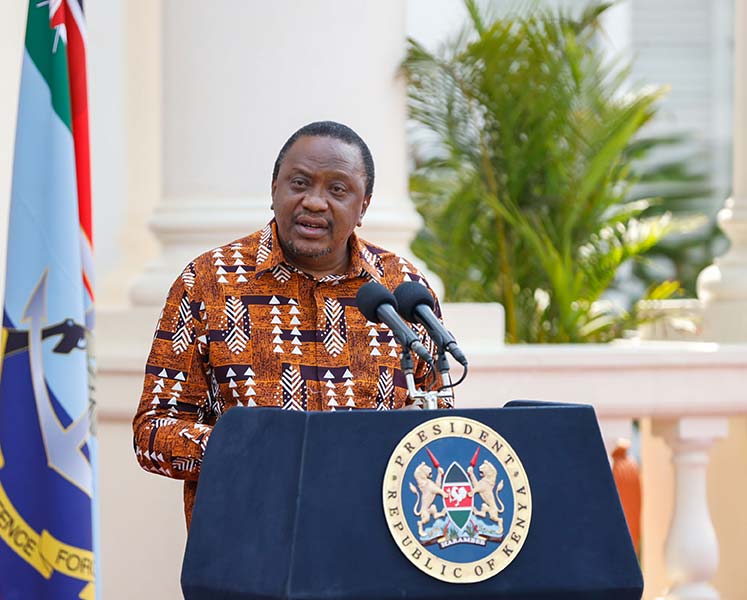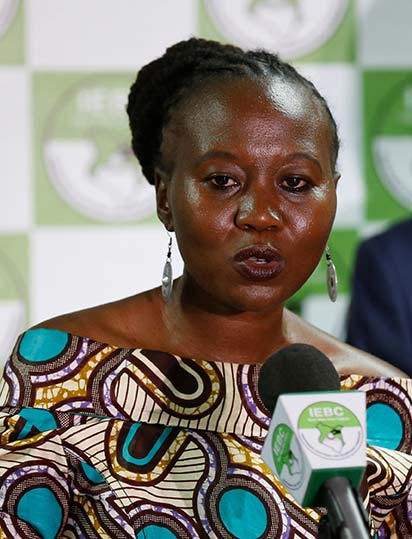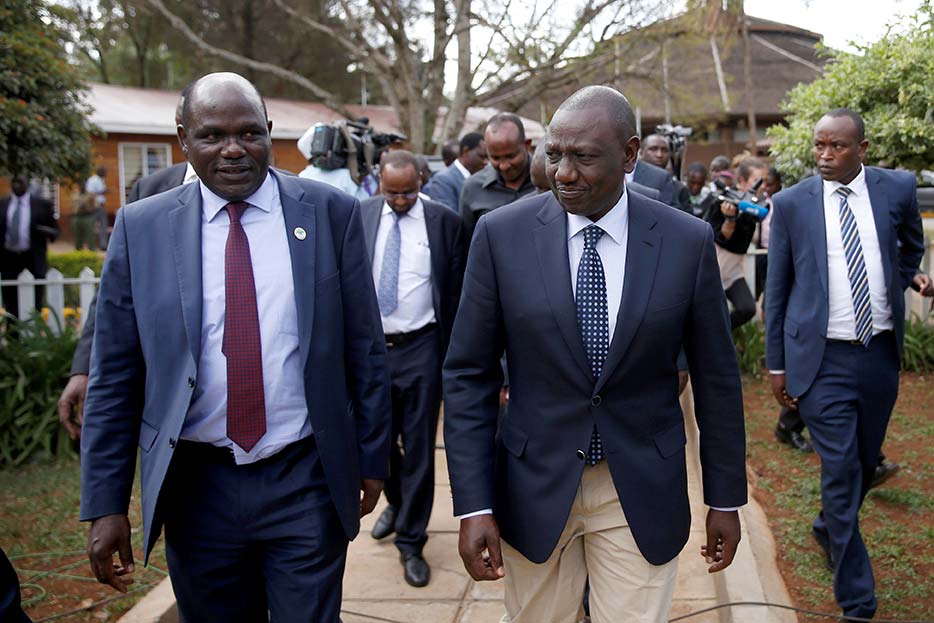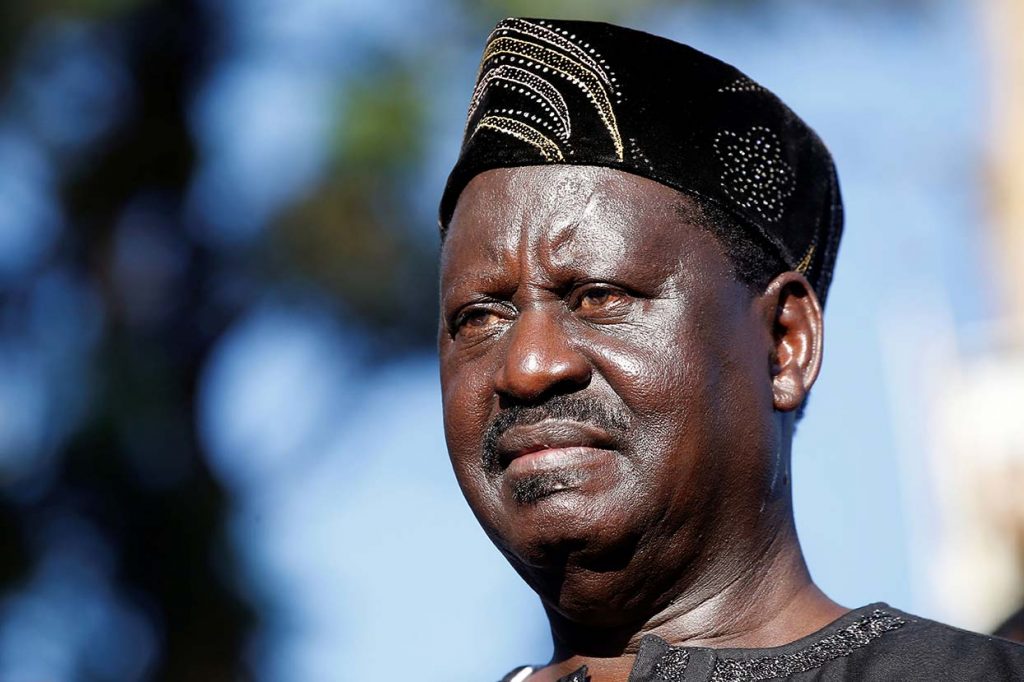Kenya’s President Uhuru Kenyatta doesn’t appear to have a clear chosen successor, and the unsolved killing of an election official shows that the country could be caught in another cycle of violence as Election 2022 jitters set in. Carey Baraka reports.
Days before Kenya’s general elections in July 2017, the bodies of Chris Msando, the official in charge of the country’s computerized voting system, and his companion Carol Ngumbu were found on the outskirts of Nairobi two days after they went missing. They had been strangled.
“There was no doubt he was tortured and murdered,” said Wafula Chebukati, chairperson of the Independent Electoral and Boundaries Commission (IEBC), at the time.
The Kenyan police arrested three people while tracing Msando’s last movements, but none ever appeared in court. Raila Odinga, one of the leading presidential candidates, alleged that Msando had been killed because he refused to hand over a password that was later used to rig the elections. Odinga said that the IEBC’s IT system had been hacked and the results altered.

While the commission acknowledged that there had been a hacking attempt, it said the attempt had failed.
The vote went ahead as scheduled, but the results were cancelled after Odinga filed a petition with the country’s Supreme Court. On Sept. 1, the Court nullified the results and called for fresh elections. It said the IEBC had failed to provide requested information on its IT system’s firewall configuration, leaving them with no choice but to accept Odinga’s claim that the system and the data were compromised.
The electoral commission’s credibility was dealt another blow just days ahead of the new elections, when the commissioner Roselyn Akombe resigned and fled to the United States. Together with Chebukati and the commission’s CEO Ezra Chiloba, Akombe was the face of the vote. But she said that political interference had rendered IEBC so dysfunctional that it could not carry out credible elections as scheduled. Akombe said that she and other commissioners had been threatened by political actors and protestors frustrated with the IEBC’s failure to effect the reforms ordered by the court.
Jitters
Akombe, still in the United States, is now calling for an inquest into Msando’s death, for which no one has been found guilty. That she is bringing up the case now has caused jitters among Kenya’s political set. Kenya holds general elections every five years, with the next vote scheduled for August 2022. Akombe’s statements about the IEBC ensure that its credibility – and its ability to conduct free and fair elections – remain in question.

Adding to the volatility, incumbent President Uhuru Kenyatta is legally barred from seeking another term.
Succession politics have started playing out, with numerous figures around him jostling for the chance to occupy the presidential office in 2022.
On July 29, the third anniversary of Msando’s death, Akombe announced her willingness to testify in the inquest about the killing, which she described as an inside job. “Painful that instead, on this day three years ago, your own colleagues led you to the slaughter house,” she tweeted. “We will find justice for you, no matter how long it takes.”
Chiloba allegedly responded to the comments with an email, which Akombe shared on Twitter, that many interpreted as a threat. “Do not attempt to rewrite history. Our silence is not your license,” it read.
Electoral violence
Akombe’s call for an inquest should be considered in the context of Kenya’s electoral history. Independent Kenya’s first multiparty democratic election was held in 1992, and cycles of violence have surrounded each subsequent election, with no one ever held accountable. In 1992, 1,500 people were killed in waves of violence along ethnic lines, and an estimated 300,000 were displaced. It later emerged that members of the ruling party, the Kenya African National Union (KANU), had funded and supported the violence. Five years later, the KANU again backed attacks in the Coast Province that displaced up to 10,000 people and killed 104.
While the 2002 and 2013 elections saw fewer clashes, the period after the 2007 election was characterized by significant violence. In December 2007, incumbent President Mwai Kibaki was sworn in under the cover of darkness and amid allegations of vote rigging that many alleged the electoral commission ignored. Violence broke out across the country, and as many as 1,400 people were killed over the next few weeks. Only the involvement of mediators led by former U.N. Secretary-General Kofi Annan prevented Kenya from slipping into civil war.
The 2007 election marked the first attempt to prosecute the instigators of any of Kenya’s electoral violence. In 2010, International Criminal Court prosecutor Luis Moreno Ocampo named six high-profile Kenyans suspected of being behind the violence – with charges including murder, incitement, deportation, persecutions and torture, and mass rape. Among them were Kenyatta, then the minister of finance, and William Ruto, a Rift Valley politician.

The cases collapsed. Kenyatta and Ruto came together in a coalition for the presidential ticket in 2013, casting themselves as the victims of an imperialist ICC plot. They won the election, and their government frustrated the ICC investigation by blocking the court from accessing the suspects’ wealth declarations, government officers, and security agents accused of involvement in the violence.
Msando was killed in the lead-up to their successful bid for re-election in 2017. On the day his body was found, Kenya’s director of public prosecutions, Keriako Tobiko, said he had appointed three prosecutors to look into the case. The country’s secretary of the interior, himself accused of facilitating the killings of unarmed civilians by the police after the Supreme Court nullified the elections, said the country’s best detectives were on the case. Three years later, there is little indication the Kenyatta-Ruto government is interested in solving Msando’s alleged murder.
The Msando affair is now part of a pattern in which electoral violence in Kenya often goes unsolved and unpunished.
One-woman mission
Akombe is on a one-woman mission not to let it go, but the threats against her and members of her family show that those willing to speak out against state capture and violence often have to leave the country to do so. As Paul Muite, one of Kenya’s leading lawyers, said, “Once the government knows you’re a witness, you have literally signed your death warrant.”

John Githongo, a Kenyan whistleblower who went into exile in 2005 after reporting on one of Kenya’s biggest corruption scandals as the permanent secretary for governance and ethics in the office of the president, is skeptical about the chances of an inquest. It is “highly unlikely unless there is a tremendous political disruption in Kenya,” he said in a text message. “Our justice system is very much a work in progress, and [it is] currently frozen in a hostile posture between the Judiciary and the Executive.”
In addition to the tensions between the judiciary and the executive branches, the Kenyatta-Ruto alliance is crumbling. Recently, there was a purge of Ruto allies from key parliamentary positions, and the overriding feeling among political commentators is that Kenyatta won’t support Ruto as his successor, contrary to the expectations of their 2013 coalition agreement.
In fact, the 2013 coalition was cobbled together from the shared ignominy of being ICC indictees, with Ruto accused of organizing attacks against members of Kenyatta’s Kikuyu community, and Kenyatta accused of funding and organizing reprisal attacks against members of Ruto’s Kalenjin community. Should the two of them fall out, then waves of violence could break out between the two communities during the 2022 elections.
With less than two years to the next election, there is a growing fear that Kenya will be sucked into another cycle of violence – a cycle in which the perpetrators will again face no punishment.